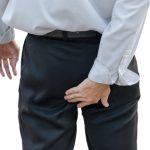Physicians have known for quite some time that those with erectile dysfunction (ED) are at higher risk for cardiovascular disease (CVD). Though there are other causes such as diabetes, depression and nerve damage, the buildup of detritus in the blood vessels is the most common cause.

Cardiologists often call erectile dysfunction the canary in the coal mine. The smaller arteries that feed the penis with blood in order to cause an erection also clog up with plaque faster than those of the heart or leading to the brain. That’s why ED occurs long before a heart attack or stroke.
The problem is a lot of men ignore ED, letting the issue worsen. But for those who confront this medical problem head on, a new cost-analysis study shows that those men benefit immensely. In this study, researchers wanted to look at the cost of screening ED sufferers for CVD and what if any savings occurred from such screening.
Investigators found that the risk of ED for those who had CVD was 44%. That equates to about two million men. Over the last 20 years, screening men who have ED for CVD would have turned up 5.8 million previously unknown cases, researchers discovered. The cost for this massive screening would have equaled $2.7 billion. But over a million cardiovascular events could have been prevented, saving $21.3 billion over two decades. 1.1 million cases of ED would have been treated saving $9.7 billion.
The earlier ED and CVD are detected, the better the treatment options and outcomes. Moreover, less serious treatments are also less costly both to the patient and to the overall healthcare system. This study supports previous findings where CVD screening was encouraged for men suffering from ED.
Subsequently, screening may help prevent CVD and ED in a cost-effective manner, according to the study’s authors. One of the obstacles men face is embarrassment that keeps them from addressing ED with their doctor, or causes them to wait until it is a pernicious problem that has gotten out of hand. If it happens more than just occasionally, talk to a doctor or urologist. While there, ask to be screened for CVD as well. It just might save your life.

